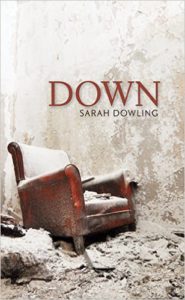Down
 by Sarah Dowling,
by Sarah Dowling,
Coach House Books, 2014,
88 pages, paper, $17.95,
ISBN: 9781552452981
Buy the Book
Sarah Dowling’s Down ends with a process note, which is where I began reading. Dowling offers up her source texts, which include songs by the Temptations and Aaliyah, Frank Ocean’s coming out letter, Frank O’Hara’s poem “Morning,” and an interview with Andy Warhol, among others. Because these sources were unfamiliar to me, I went searching for the original texts to better understand the ways that Dowling “flattened” the language as she worked through the project. The research became the poems as I read O’Hara’s “Morning” while listening to Ocean’s “Lost,” unknowingly also hearing a recitation of O’Hara’s poem overlaid on the song. This is how I can best describe these poems: the words morph into one another to create a new narrative — sometimes familiar and sometimes disorienting. They contain threads of love and danger; they feel new at the same time as they feel known. These are poems to live with until they are in your veins, like songs.
Dowling’s explanation of her process helped me to see the complexities of thought that create these poems’ form. Thinking about process took me into the making of a book, which includes the finishing. Here, Coach House delivers a book as well-crafted as the poems on the page. First, I am taken by the texture of the paper and the texture of words and space. The text creates a sense of wandering into the gaps between intimacy and secrecy.
The poems speak to the reader in low tones, call us “Honey” and “Baby,” get down to the birds and the bees from the beginning. “Sunshine Honey” immediately creates an intimacy between reader and poems — we are connected by the familiar song, the sex and the sexlessness, the distance and the longing for some other feeling. Except that we don’t really know who this “me” is — it’s like having sex on a first date. We are feeling and being with the body of the poems, but we haven’t had many conversations, so we’re not sure what this narrative is all about. It takes a few readings to delve into the depths that Dowling offers us in Down, but it’s worth the exploration. She asks:
What could make this aesthetics. What could make me feel
that. Make me many. Make me better. What could make me
sexless and sexual. Make me feel we. Make me feel made.
Make me feel us. Make me feel matter. Make me feel this,
for one. What could make me feel this commotion, this
relationship to energy. What could make me feel this way.
The poems teach us how they “make this aesthetics” — they layer what is familiar with what is completely disorienting. We come through the first section of the book feeling a little bit wooed by the words. This is a fragile kind of adventure. We want to keep feeling this way, so we turn the pages over and over, keep being that somebody who is reading. We get sentimental. We get dreamy. We want to tell someone else how we feel. And so do the poems.
Later, the book moves into darker spaces. The text juxtaposes sunshine and beaches with house fires and graves. The spaces between words create more deliberate disorientation. The feeling of not knowing where you are, where the burial is taking place, comes over you. This crescendo peaks with the poem “Starlight Tours”:
winter taken screaming he on
night out bitterly outskirts
bitterly kneel
on him last cold on the
seen nights river
cold of cold and
winter November
The poems in Down settle us firmly in the hinterlands, in the “waste fields around ports and airports,” in the “locations of secret pleasure and concealed terror.” Dowling takes us into warmth and desolation, speaks to us sweetly in a language that we do not quite yet understand.
These poems will keep you company at night, and remind you simultaneously of our interconnection and our isolation. Down offers intimacy and asks you to do the work that is required to maintain it. This is a book of relationship and revelation, surrender and devotion. These are poems you’ll want to keep near you as you the weather transitions. Read Down — let it sing to you.
— Cathleen Miller

